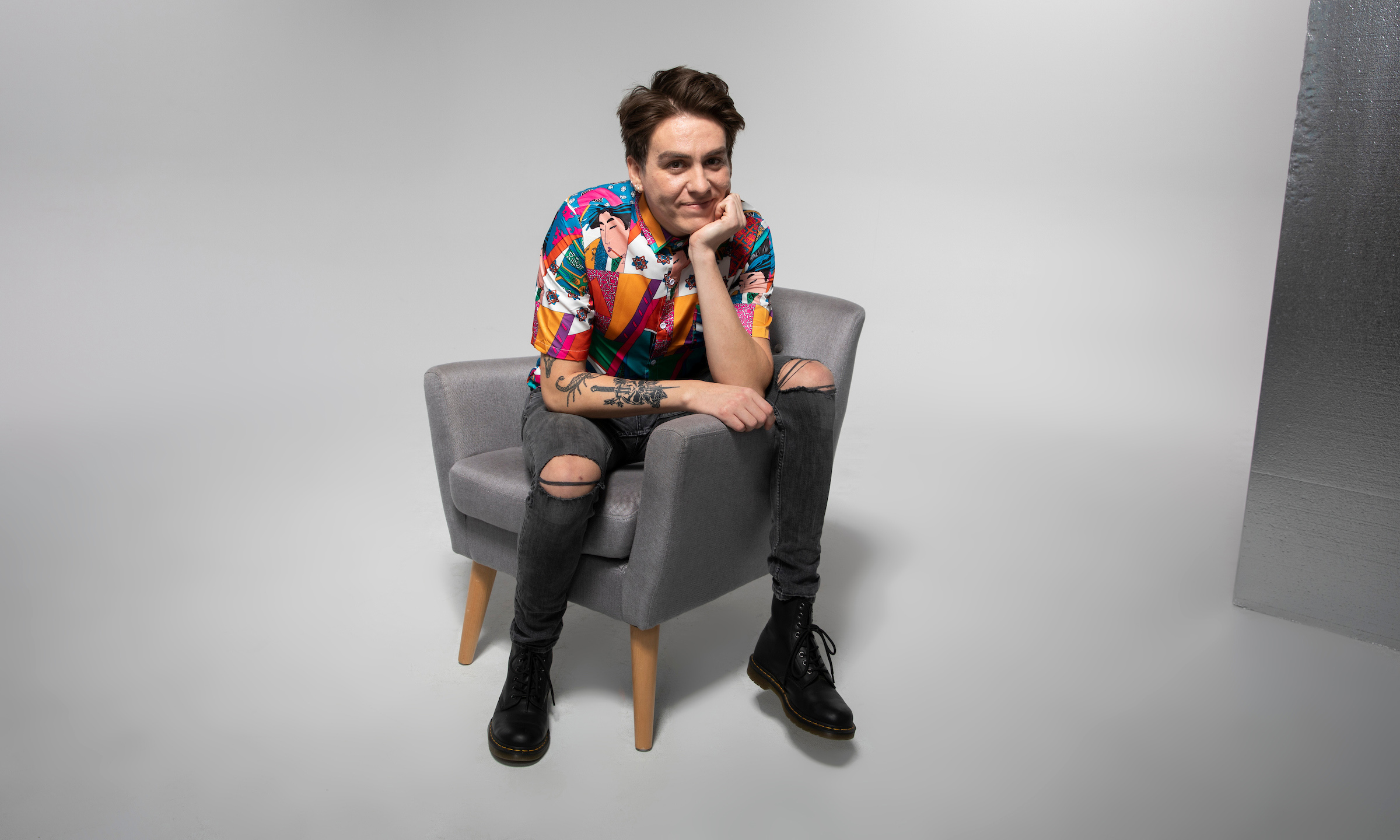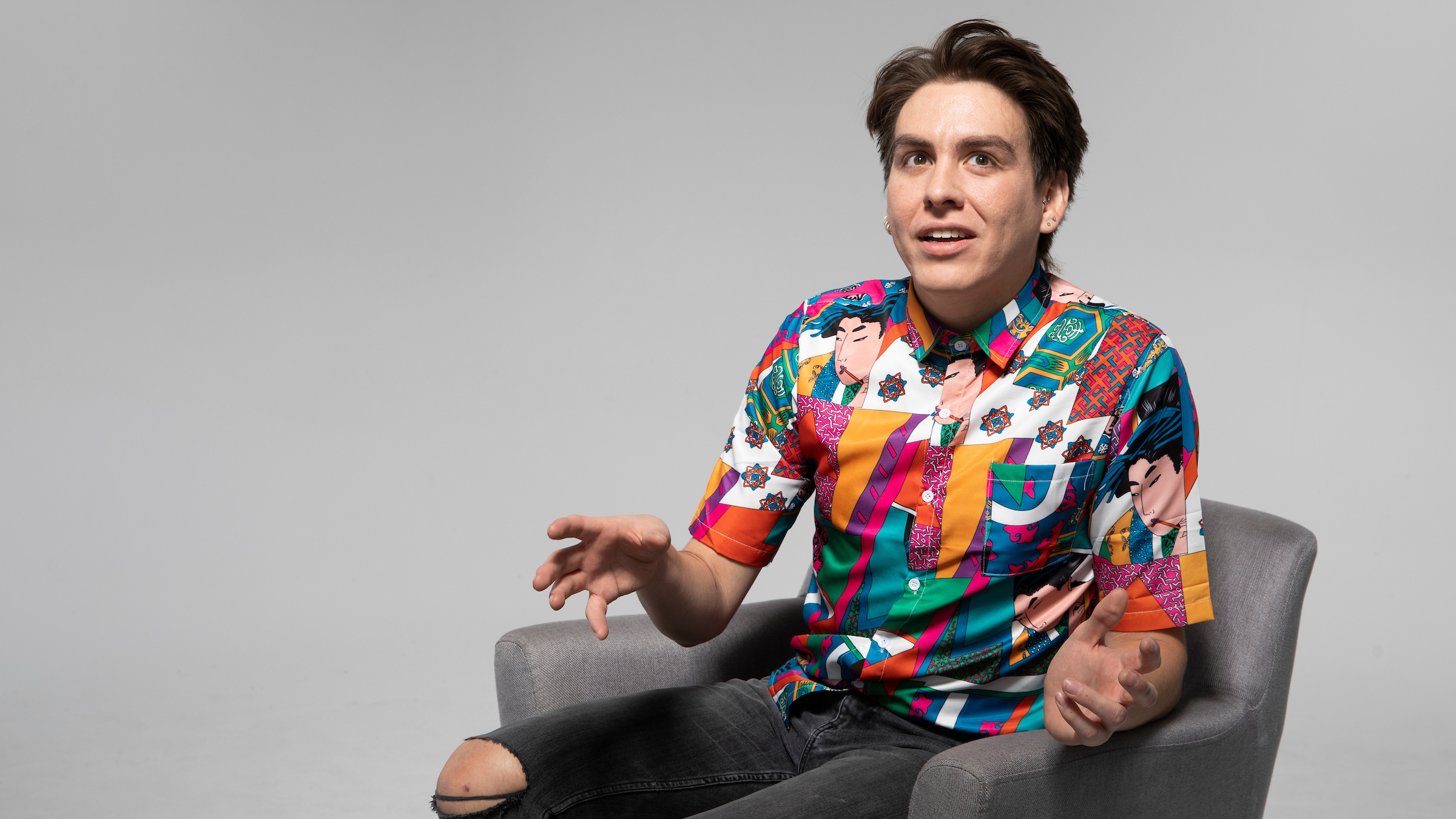As told by David Warr
UVU was a safe place where my creativity could flourish. It gave me a second chance at success and happiness.

Photo by Erik Flores
In telling my story, I wish I could only focus on the beautiful things that I have done, highlighting my accomplishments at UVU and in the community. But a crucial part of that was years of running at a wall of failures — because after many failed attempts, I found my passion and direction in life. My story starts at the beginning of that journey.
I feel that I was an odd, curious, and eccentric child full of so many questions. At 6 years old, I remember asking my mom questions like, “Why is the sky blue?” As I got older and started asking more challenging questions, my mom would say, “I don’t know, ask your dad.” She would always say that, and it got to the point where I even asked if my mom knew anything! I see myself as someone interested and curious, and I will admit that curiosity has gotten me into trouble here and there. I grew up in my little world in many ways, spending more time with plants and animals than with my peers. At some point I got more social, but I was very introverted for most of my life.
My mom was an immigrant, so I grew up trying to deconstruct my identity and purpose in life and identify my commitment to three separate cultures: my religion, Mexican heritage, and the United States. Sometimes these cultures seemed to clash. I grew up in a religious home where we had standards that often conflicted with our Latin customs. As if this wasn’t enough, immigrants are expected to become fully assimilated — so while I was trying to identify with my Latin heritage, I was forced into conflict with another cultural identity. This cultural juggling act pushed me to be more introverted because it was easier to go chill with animals or plants and not deal with any of the pressure I experienced.
All this inner conflict made school difficult for me. Because I also spoke Spanish, I had difficulty speaking English. I attended speech therapy in the first grade, but my hindered speech made it harder for me to make friends. I hung out with a handful of people, but no one I could call a true friend. None of them were people in whom I could confide. For the longest time, that was a source of shame for me. I felt terrible about not having close friends, and it was a lonely time. At some point I thought, “I know how I would want a friend to be if I had a friend,” so I tried to embody that.
From an early age, I knew that I was attracted to both genders. For a long time, I didn’t talk about that. Before UVU, I attended another university where I experienced isolation and difficulty approaching my professors because of my sexual orientation. I felt like I was an outcast and that if people knew the real me, they wouldn’t have accepted me. I was a good student in high school, but college was much more difficult for me. Amid this disorienting chapter of my life, I had a traumatic experience where I was drugged and sexually assaulted. For a while, I internalized the trauma because I didn’t feel supported by the faculty and staff. I finally met with my academic advisor and broke down as I told her what had happened. She told me that she needed to report the incident. When I made the report, I felt like I was being vilified when I was the victim of a traumatic experience.
Following that experience, I attended the university for another two or three semesters and failed all of them. All that time, I continued to battle loneliness and isolation. I was not able to thrive or succeed because I was alone dealing with my issues. Because of my accomplishments in high school, I was on scholarship. So, I made one of the hardest decisions when I gave up my scholarship and dropped out of school. In doing so, I placed higher importance on my well-being than on financial aid and education.
After dropping out of school, I took a year off to decide what was best for my future. This was not the first time that I had taken a break from school. For me, school had been a series of ups, downs, roadblocks, and confusion. I had switched my major several times. In the beginning I wanted to be an artist, and there were a couple of programs that I didn’t get into after applying multiple times. After that, I did linguistics and spent two years in Japanese. I then switched to English, which I was studying when my time ended at the other university.

It wasn’t until starting at UVU in January 2019 that I realized what interconnected all of what I had studied: communication. With art, it was visual communication and media and how that media shapes our perception. Linguistics was focused on intercultural communication, which is why I was interested in Japanese, my fifth language. Studying English was another way to improve my interpersonal communication. Outstanding professors helped me find my true passion and gave me a dedicated support system. I was in a dark place for a long time, and I feel UVU was where I could close that chapter of my life.
One of the resources that helped me the most was UVU Spectrum. Even while I was attending the other university, I went to Spectrum meetings. They are very gracious with their resources and help LGBTQIA students who do not receive the help they need at their universities.
My professors and advisors helped me see that I had post-traumatic stress and had been carrying the weight of that stress for so long. They understood my needs and concerns and tried to relieve that pressure from me by offering me extensions on assignments if I needed them. I was fortunate to work closely with some of them on research projects. Most of the time, I was hanging by my professors’ coattails as they guided me through the process. They helped me recognize that everyone can do challenging things and that I needed to assess where I was skilled and train to perfect my abilities.
The inquisitive nature I had as a child grew with me into adulthood. I compiled my questions in a large journal and Google Doc, and my professors helped me answer some of those questions. I love how President Astrid S. Tuminez champions diversity of thought to let the university be a bastion for intellectual discussion. This culture allows people like me to find answers to their heartfelt questions.
Truthfully, I wanted to get through my studies as quickly as possible, walk away with a degree, and start working — but I ended up falling in love with my professors’ work and deepened my passion for education. I will graduate in spring 2020, and I am currently working toward graduate school. I want to get a master’s degree and a Ph.D. and teach at a university. I am also passionate about helping improve healthcare outcomes and access to resources for different marginalized groups. For me, UVU was a safe place where my creativity could flourish. It gave me a second chance at success and happiness.